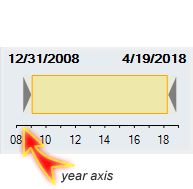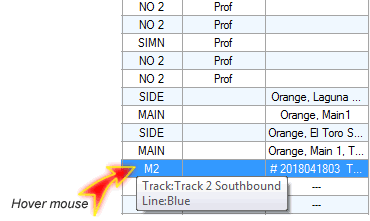
When the main window opens, the program retrieves the list of available runs and sorts them from newest to oldest by default. Because a database can contain tens of thousands of runs, you will usually want to narrow the list before you start importing.
Click the header of almost any column to sort the grid in ascending order. Click the same header again to reverse the order. This works independently for each column.

You can also filter the run list in three different ways:
Only one filter can be active at a time.
Date Range Filter

The horizontal axis shows the earliest and latest run dates in the database (from 08 (2008) to 18 (2018) in this example). The two dates in the top‑left and top‑right corners define the current filter range (December 31, 2008 to April 19, 2018). Double‑click the control to open a dialog where you can change the range.
Vehicle Filter — select a vehicle to show only runs recorded by that unit.
Client Filter — select a client to show only runs completed for that customer.
Select runs with your mouse or the standard Windows shortcuts (Ctrl+Click, Shift+Click, Ctrl+A, etc.). You can preview the currently highlighted run by choosing Run Preview from the menu. If several runs are selected, the preview shows the last one you clicked.
When you have selected the runs of interest, you can import them all in a single step.
If the columns in the grid do not give you enough context, just hover the pointer over a track name. A tooltip with the full track description will appear—typically within one to two seconds, depending on network speed.

Before you start the import, tick the types of data you want to copy from the source database to the target database:

Check the Has Profile column to see whether a run contains profile data. If it does not, the Profiles check box is ignored for that run.